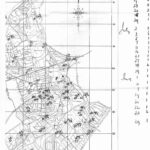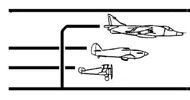| Name: | |
| Gordon Jefferson | |
| Transcript: 1 | |
| ‘Doodlebugs’ | |
‘Doodlebugs’ was the name given to the German V-1 flying bombs which were launched at London and south east England from bases on the Continent after the Allied D-Day landings in 1944. In between his time at Kingston Technical College and joining the Fleet Air Arm, Gordon briefly had a job assessing the damage caused to property in New Malden, where he was then living, by these devices.He recalls how New Malden was severely damaged by ‘doodlebugs’ and also what it was like to come under attack – particularly the terrifying moment when you heard the engine cut out and you did not know where the bomb would fall.You were living in New Malden at the time weren’t you? I was indeed. And New Malden was fairly heavily bombed during the war. It was indeed. Do you have any recollections of that at all? Oh yes. In the interval between completing my studies and getting – passing the exams for the Institution – I had a few months before anything happened about joining the Navy. And in that time I got a job with the local Council and that job consisted of going round all the damage done by the ‘doodlebugs’ and making a note of what damage it had done. Like: this house was completely destroyed: this one’s been moved on its foundations and therefore is useless: the roof’s gone off this one so that will be demolished, but these houses could be repaired, particularly if the damage was only broken windows. But most of them had to be rebuilt, and the area around where I lived was very considerably damaged and had to be pretty well re-built. Which road was that you were living in? This was, I lived in Portland Avenue, and Portland Avenue pretty well got away with it. But between Portland Avenue and the bypass – I can’t remember among- Chilmark Gardens ran in that direction. And then road that went down to Motspur Park got some direct hits so the property there was written off completely. Our house had the roof -not blown off -but all the tiles were removed. And I had the job of climbing on the roof and putting them all back again. ‘Cause there wasn’t anybody else to do it in those days. And I had quite a good time actually it seemed very exciting, but my parents didn’t think it was that exciting. However. Why was it that New Malden got so heavily bombed whereas Kingston, I mean although of course there were bombing raids on Kingston, but Kingston got off comparatively lightly whereas New Malden does seem to have been quite badly damaged? I think it must have been purely because they either didn’t have enough fuel in the rockets – in the ‘doodlebugs’ – or they had them set to stop just a bit short. Because I believe, if you think about it if they had pressed on for another mile or two they would have been in a more congested area. On the other hand, of course, if you look north of New Malden it’s fairly open because it’s really Richmond Park area. But I can’t imagine there’s any other reason other than the fact that the gyro’s were set to topple at a certain time after launch and that resulted in them toppling in or around the New Malden area. We did of course get most of them blown up completely but we were able to collect one or two sample bits which had in fact been blown off in the blast. They were kept for quite a while because they were all chucked away in the end, so there we are. So they were first generation missiles. Yes they were indeed. Fantastic, because you hear the darn thing coming and then you rush into the house and crawl under the Anderson Shelter which was a steel box in the lounge. [What Gordon is referring to here is actually a Morrison Shelter. The Anderson Shelter was for outdoor use and was was usually constucted in back gardens. It was realised however that there was a need for an indoor shelter as many houses lacked cellars where the inhabitants could take refuge from air raids. The resulting Morrison Shelters came as an assembly kit and was free to all households with an income of less than £350 per year. It was named after Herbert Morrison – the then Minister of Home Security] And in my case the one that landed close enough, I got into the steel box and my father had put along the side of it the bench tops of the sewing machines and they were about two and a half inches thick, and really tough. And the glass from the window as it broke speared these bench tops and went in very deeply and I was on the other side of them and safe as a house with the cat. He was safe too. But that was quite exciting though my mother didn’t like it too much. Because I mean obviously it sort of traumatised people, didn’t it? Oh it did indeed, yes. Actually it’s amazing how – I was going to say- you get used to it. But the funny part about it was if you were bombed, you didn’t hear the bombs coming down. But you did hear this thing stop and therefore you knew in the next couple of minutes there was going to be one hell of a bang and you might or might not survive. |
|



